Asia Pacific
Rating Overview
Concerningly in Asia, the closed category has grown this year from seven to eight countries. Afghanistan, China, Hong Kong, Laos, Myanmar, North Korea and Vietnam remain in this category and Bangladesh has now joined them.
Eight countries are now rated repressed. Seven – Brunei, Cambodia, India, Pakistan, Philippines, Singapore and Thailand – remain in that category and the latest addition is Sri Lanka. Five are in the obstructed category: Bhutan, Indonesia, Malaysia, Maldives and Nepal.
Civic space in Japan, Mongolia and South Korea is rated narrowed with Timor-Leste improving its rating to join this category, while Taiwan remains the only country rated open.
In the Pacific, the civic space situation is better, with seven countries rated open and four rated narrowed: Australia, Solomon Islands, Tonga and Vanuatu. Fiji, Papua New Guinea and Nauru remain in the obstructed category.
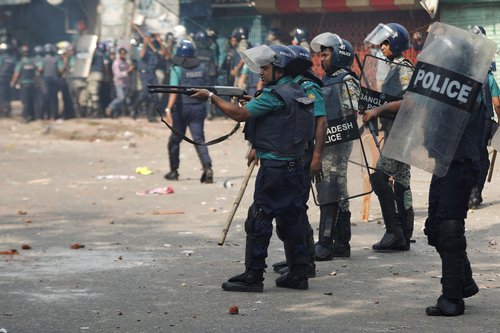
Bangladesh has been downgraded to closed due to an escalating crackdown on the opposition, activists, journalists and dissenting voices ahead of national elections scheduled for January 2024. Since the start of 2023, the authorities have ramped up their targeting of the opposition with thousands of fabricated cases filed against them, and there has been a brutal crackdown on their protests. The government has also escalated its targeting of HRDs through judicial harassment and smear campaigns, as experienced by the human rights CSO Odhikar. Authorities have also increasingly attempted to silence the media through censorship and the judicial harassment of journalists. Critical media outlets have been shut down and attacked and journalists and their families targeted. The draconian Digital Security Act, which was used to criminalise thousands of online critics, has been replaced by the Cyber Security Act, which retains most of the repressive offences. The government continues to use the Foreign Donations (Voluntary Activities) Regulation Act and the NGO Affairs Bureau, which sits under the prime minister’s office, to restrict and harass CSOs. Enforced disappearances are used as a tool to suppress dissent.
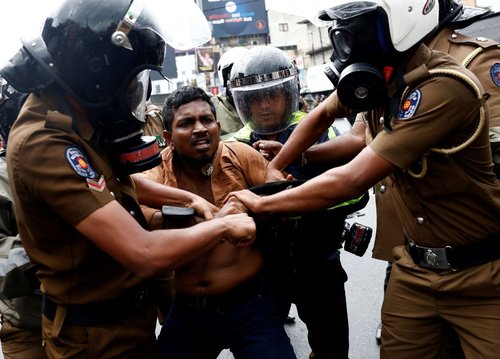
In Sri Lanka over the past year, authorities have harassed HRDs, protest leaders and social media activists by hauling them up for interrogation or prosecution while others have faced surveillance, intimidation and threats. Journalists have been targeted with judicial harassment and restrictions for undertaking their work and assaulted during protests. There were reports of excessive force, including the use of teargas, by the police in response to several protests, particularly by students, as well as intimidation of people from the Tamil minority seeking justice for past crimes in the Northern and Eastern provinces and restrictions on their protests. The International Convention on Civil and Political Rights (ICCPR) Act No. 56 of 2007 is used to stifle expression while the Prevention of Terrorism Act is used to target and harass activists, journalists, protest leaders and minorities. A revised version of the anti-terror law still put rights at risk while an Online Safety Bill could be used to further restrict online expression.
There has been some progress in Asia and the Pacific, as the upgrading of Timor-Leste from obstructed to narrowed shows. Fundamental freedoms have generally been respected by the Timorese authorities and the government has created an enabling environment for HRDs. Journalists are mostly free to report the news although a few have faced police harassment. The country is ranked in 10th place in the World Press Freedom Index published in May 2023 by global media watchdog Reporters Without Borders. Freedom of peaceful assembly is respected in practice, although the law places some unjustified restrictions on protests.
Civic Space Restrictions
The main civic space violation documented in the Asia Pacific region is the use of intimidation to stop activists speaking out and journalists exposing violations. Another widespread trend across the region is censorship, used to block criticism of those in power or deny people the ability to receive and share information. Governments also detained protesters in numerous countries and prosecuted HRDs, using an array of restrictive laws.
Intimidation of human rights defenders and journalists
The use of intimidation as a tactic to silence HRDs and journalists was documented in at least 22 countries in Asia and the Pacific. Among the methods deployed were the surveillance of activists and civil society groups, raids on the homes and offices of activists and journalists, and vilification and threats against their lives and safety.
In Afghanistan, the homes of women HRDs, particularly those involved in protests, have been frequently raided by the Taliban. Often, women HRDs have been interrogated to pressure them to give up information or sign documents vowing they will not talk to the media or take part in any further protest activities before being released. In India, activists have faced intimidation from the National Investigating Agency and are often accused of being security threats while others have faced abductions and attacks. Media outlets such as the BBC and NewsClick have faced raids for their critical reporting while activists and journalists in Indian-administered Kashmir have increasingly been targeted.
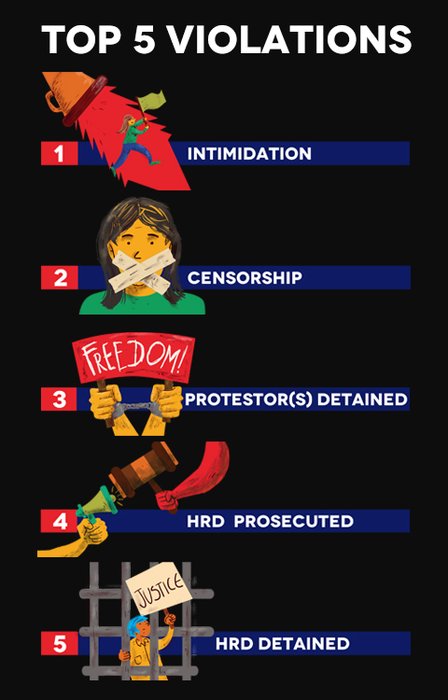
In Bangladesh, journalists have been targeted, while the authorities have also harassed the families of journalists in exile and those demanding justice for enforced disappearances. Activists and people involved in commemoration initiatives in relation to the former civil war in Sri Lanka often face surveillance, intimidation and harassment by intelligence services, the military and the police. There have also been reports of the intimidation of journalists as well as protesters seeking justice for past crimes in the Northern and Eastern provinces. In Nepal, there are continuing reports of harassment, threats and physical attacks against journalists from both state and non-state sources.
Journalists continue to face harassment and threats in Indonesia, particularly those in the Papuan region, while activists were stifled when organising civil society events around the G20 and Association of Southeast Asian Nations (ASEAN) summits. In July 2023, civil society groups cancelled a regional gathering of LGBTQI+ activists in Indonesia in response to harassment and death threats from Muslim conservatives.
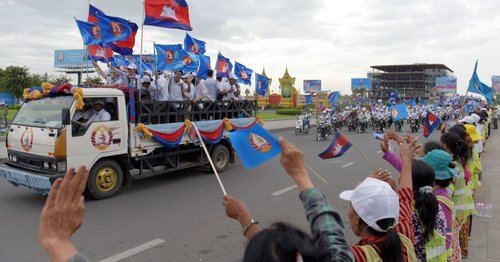
In Malaysia, protesters are often hauled up for questioning and an HRD found an improvised explosive device under her car. In Cambodia, CSOs have faced ongoing threats of being shut down, and there were physical attacks on the political opposition and critics. In the Philippines, red-tagging – labelling people as communists – has continued against HRDs, particularly Indigenous rights activists, along with designating them as terrorists, putting them at great risk of facing attacks. There have also been reports of state surveillance of progressive groups including Anakbayan and Gabriela and cases of abductions of development workers, labour rights activists and Indigenous and environmental activists.
In July 2023, the Hong Kong authorities announced that eight exiled democracy activists will be pursued for life for alleged national security offences and issued bounties for their arrest. Police officers from the national security department also harassed and interrogated their family members in Hong Kong. Trade unionists in South Korea have faced vilification, harassment and attacks.
In the Pacific, journalists have faced intimidation for carrying out their work. In Papua New Guinea, at least two journalists from The National and Post Courier were harassed and threatened by supporters of a former parliamentarian while covering a court case he was involved in. In May 2023, a journalist from the Samoa Observer was summoned by a minister who was unhappy with her coverage of him and threatened with detention when she refused to reveal her sources.
Censorship of critical voices
Another key civic space concern in the Asia Pacific region is the use of censorship by governments, documented in at least 21 countries. Over the year, the authorities used their powers to restrict access to information critical of the state by blocking TV broadcasts and news portals, deleting social media posts, ordering the media to remove news coverage, banning publications and targeting journalists and news outlets.
China, which has an extensive censorship regime, deployed it to prevent people seeing scenes of protests in multiple Chinese cities at the end of 2022. Videos and posts on social media about the protests were deleted by the ruling party’s vast online censorship apparatus and words that referenced the protests were censored. In June 2023, censors scrubbed the internet of any words or symbols that could be used to reference the Tiananmen Square massacre in the run-up to its anniversary. The North Korea regime continues to block access to foreign media, particularly from South Korea. Punishments for accessing or distributing such media include jail, forced labour and execution.
In Malaysia, censorship efforts have increased under the government of Prime Minister Anwar Ibrahim. In June 2023, the news portal MalaysiaNow was inaccessible to some users and blocked by some internet service providers. In July 2023, the blog of a political commentator based in the UK and a website of a government critic were restricted. In August 2023, the government blocked some internet users accessing another news site, UtusanTV.com. In Thailand, a major satellite and cable TV provider appeared to have blocked broadcasts about the Thai election by several international news agencies in June 2023. The BBC’s interview with the leader of the opposition Move Forward party was taken off the air by cable and satellite TV provider TrueVisions. Other international news agencies also reportedly had their election-related news segments blocked.
In Vietnam, hundreds of websites have been blocked and the authorities have pressured social media platforms to step up their censorship of ‘anti-state’ posts. In Singapore, the Protection against Online Falsehoods and Manipulation Act permits a single government minister to declare that information posted online is ‘false’ and to order the content’s ‘correction’ or removal if this is deemed to be in the public interest. In June 2023, the authorities used the law to block access to news website Asia Sentinel because of an article critical of the government.
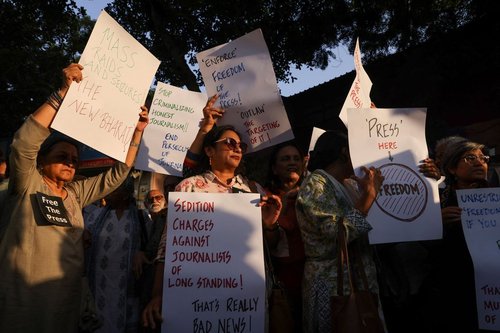
The government of Prime Minister Narendra Modi in India has also sought to censor critical reporting. In January 2023, the government used emergency powers under the 2021 Information Technology Rules to ban a documentary critical of Modi and his role and passivity during 2002 riots in Gujarat state. It was blocked from being accessed or shared online in India. Indian-administered Kashmir has experienced regular internet shutdowns and restrictions that prevent critical reporting in the region. The Kashmir Walla outlet was forced to shut down after its site was blocked. An internet shutdown was also imposed in Manipur following the outbreak of violence in May 2023.
In Pakistan, the Pakistan Electronic Media Regulatory Authority (PEMRA) blocked the transmission of critical news programmes and revoked media licences. In March 2023, PEMRA banned TV channels from broadcasting speeches and news conferences by former prime minister Imran Khan. In May 2023, authorities also restricted access to social media platforms in major cities and cut off mobile internet services amid mounting protests generated by the arrest of Imran Khan.
In the Pacific, it was reported that the Tonga Broadcasting Commission had banned a song in July 2023 that commemorated a 2009 ferry tragedy, while there has been a lack of transparency about a group of asylum seekers intercepted in September 2023 as they attempted to arrive in Australia by boat, who were sent to Nauru.
Protesters detained
Across the Asia Pacific region, people mobilised to call for democratic reforms, labour and environmental rights and push for justice, equality and accountability. In response, states deployed security forces to arrest and detain protesters in at least 21 countries.
In Afghanistan, scores of protesters, the vast majority of them women, who mobilised to demand access to education and employment were detained by the Taliban. Some were held for a relatively short time but others endured weeks or months of detention and torture and ill-treatment. Most recently, women protesters Zholia Parsi and Neda Parwani were detained in September 2023. The Taliban routinely use violence to gain access to detainees’ mobile phones so they can identify other members of protest networks.
In Maldives, protests by the opposition coalition through the year were often met with arrests and ill-treatment including through the police chasing and dragging protesters and using pepper spray, resulting in injuries. In Bangladesh, hundreds of members of the main opposition party have been detained and prosecuted on fabricated charges for their involvement in mass protests ahead of the 2024 elections. Some were picked up by the police ahead of protests.
In Pakistan, in May 2023, police carried out mass arrests and detained more than 4,000 people, including members of the political opposition, in the wake of protests over the arrest of Imran Khan. Many were charged under vague and broad laws that prohibit rioting and creating threats to public order. Some are being tried in military courts, raising questions around due process and fair trial rights.
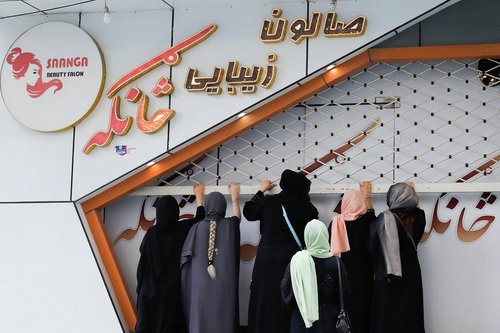
Protesters have also been detained in Indonesia, particularly in the Papuan region. In one incident in August 2023, at least 37 supporters of the pro-independence West Papua National Committee were arrested in relation to peaceful demonstrations in various cities. Police used excessive force and arrested dozens of people in September 2023 for protesting against government plans to evict thousands of people in the Riau Islands province.
In Cambodia, trade union leaders were convicted in May 2023 for organising a protest strike. In Thailand, democracy activists have been detained and convicted for making speeches during protests while activists, including students, have been detained and convicted on royal defamation charges for their speeches or social media posts during protests.
In the Pacific, scores of climate activists have been arrested across Australia for various protests including disruption of traffic to draw attention to the global climate emergency. At least five states have passed anti-protest laws, including South Australia in May 2023, to ramp up fines for disruptive protests. Climate protesters have also been arrested in New Zealand.
Human rights defenders prosecuted
Another top violation documented across the Asia Pacific region was the prosecution of HRDs, reported in at least 13 countries. Many were criminalised under national security, public order or criminal defamation laws.
In China, scores of HRDs were prosecuted under vague and broad provisions of ‘subversion of state power’ or ‘picking quarrels and stirring up trouble’. In Hong Kong, the draconian National Security Law has been used to detain and prosecute democracy activists, including human rights lawyer Chow Hang-Tung, and keep them behind bars.
In Vietnam, more than 100 HRDs remain in prison, jailed on trumped-up charges of ‘conducting propaganda against the state’ and ‘abusing democratic freedoms’. More recently, tax evasion laws have been used to jail HRDs. In Cambodia, ‘incitement’ provisions have been used to prosecute trade unionists, such as Chhim Sithar, as well as environmental and land rights activists. In Myanmar, dozens of HRDs were jailed on fabricated charges of ‘high treason’, ‘terrorism’ or ‘incitement’ after unfair trials. In Thailand, scores of democracy activists and critics of the regime have been prosecuted for royal defamation, including human rights lawyer Anon Nampa, who was sentenced to four years in jail, while others have been denied bail. In Indonesia, authorities have used the Law on Electronic Information and Transactions to criminalise HRDs, including Haris Azhar and Fatia Maulidiyanti for a video discussing military involvement in the mining industry in Papua. Treason charges have been used to prosecute peaceful pro-independence activists in the Papuan region. Singaporean human rights lawyer M Ravi has also faced legal persecution for his work
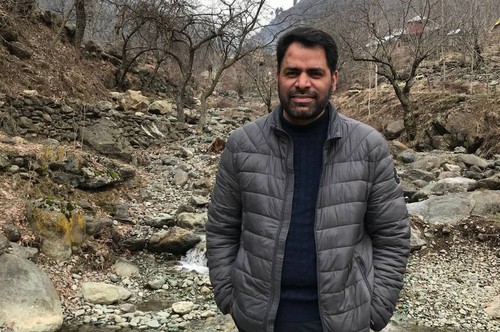
In India, there is an increasing use of the draconian Unlawful Activities Prevention Act, an anti-terror law, against HRDs. Many people remain in pretrial detention for long periods including activists charged with violence in Bhima Koregaon and Kashmiri HRD Khurram Parvez. In Bangladesh, HRDs Adilur Rahman Khan and ASM Nasiruddin Elan from Odhikar were sentenced by the Cyber Tribunal of Dhaka to two years in jail in retaliation for their work documenting human rights violations. In Pakistan, HRDs including Muhammad Ismail have faced charges under the Prevention of Electronic Crimes Act, 2016.
In the Pacific, whistleblower David McBride is being prosecuted for leaking classified information of misconduct by Australian special forces in Afghanistan, while another whistleblower, Richard Boyle, is being prosecuted for exposing aggressive debt recovery practices by the Australian Taxation Office.

India and Cambodia
There are serious concerns about the ongoing regression of civic space in India. Over the year, HRDs and journalists were arrested or detained under the Unlawful Activities Prevention Act or for other offences. Other have faced harassment, raids and assault by the police. News outlets have been raided and prolonged internet shutdowns have been imposed in Indian-administered Kashmir and Manipur. The government has also cracked down on international funding for CSOs using the Foreign Contribution Regulation Act. There have been repression of protests and a growing practice of demolishing the homes of Muslim protesters. The judicial harassment of activists and journalists in Indian-administered Kashmir has persisted.
Another country of concern is Cambodia where repressive laws are routinely misused to criminalise HRDs, trade unionists, environmental and youth activists and journalists. Highly politicised courts mean that those arbitrarily detained and charged are often held for prolonged periods in pretrial detention. The media continues to face restrictions, exemplified in the closure of Voice of Democracy in February 2023. Around the elections in July 2023, the political and civic space environment became more repressive with the leading opposition Candlelight Party barred from running and opposition activists facing various forms of harassment and physical attacks. The 2015 Law on Associations and Non-Governmental Organizations continues to restrict the right to freedom of association.
| COUNTRY | SCORES 2023 | 2023 | 2022 | 2021 | 2020 | 2019 | 2018 |
| AFGHANISTAN | 13 | ||||||
| AUSTRALIA | 72 | ||||||
| BANGLADESH | 20 | ||||||
| BHUTAN | 59 | ||||||
| BRUNEI DARUSSALAM | 33 | ||||||
| CAMBODIA | 27 | ||||||
| CHINA | 12 | ||||||
| FIJI | 60 | ||||||
| HONG KONG | 15 | ||||||
| INDIA | 31 | ||||||
| INDONESIA | 46 | ||||||
| JAPAN | 75 | ||||||
| KIRIBATI | 83 | ||||||
| LAOS | 7 | ||||||
| MALAYSIA | 47 | ||||||
| MALDIVES | 46 | ||||||
| MARSHALL ISLANDS | 84 | ||||||
| MICRONESIA | 84 | ||||||
| MONGOLIA | 61 | ||||||
| MYANMAR | 12 | ||||||
| NAURU | 49 | ||||||
| NEPAL | 46 | ||||||
| NEW ZEALAND | 89 | ||||||
| NORTH KOREA | 2 | ||||||
| PAKISTAN | 30 | ||||||
| PALAU | 92 | ||||||
| PAPUA NEW GUINEA | 60 | ||||||
| PHILIPPINES | 34 | ||||||
| SAMOA | 81 | ||||||
| SINGAPORE | 31 | ||||||
| SOLOMON ISLANDS | 71 | ||||||
| SOUTH KOREA | 75 | ||||||
| SRI LANKA | 31 | ||||||
| TAIWAN | 81 | ||||||
| THAILAND | 28 | ||||||
| TIMOR-LESTE | 69 | ||||||
| TONGA | 76 | ||||||
| TUVALU | 88 | ||||||
| VANUATU | 79 | ||||||
| VIETNAM | 18 |


